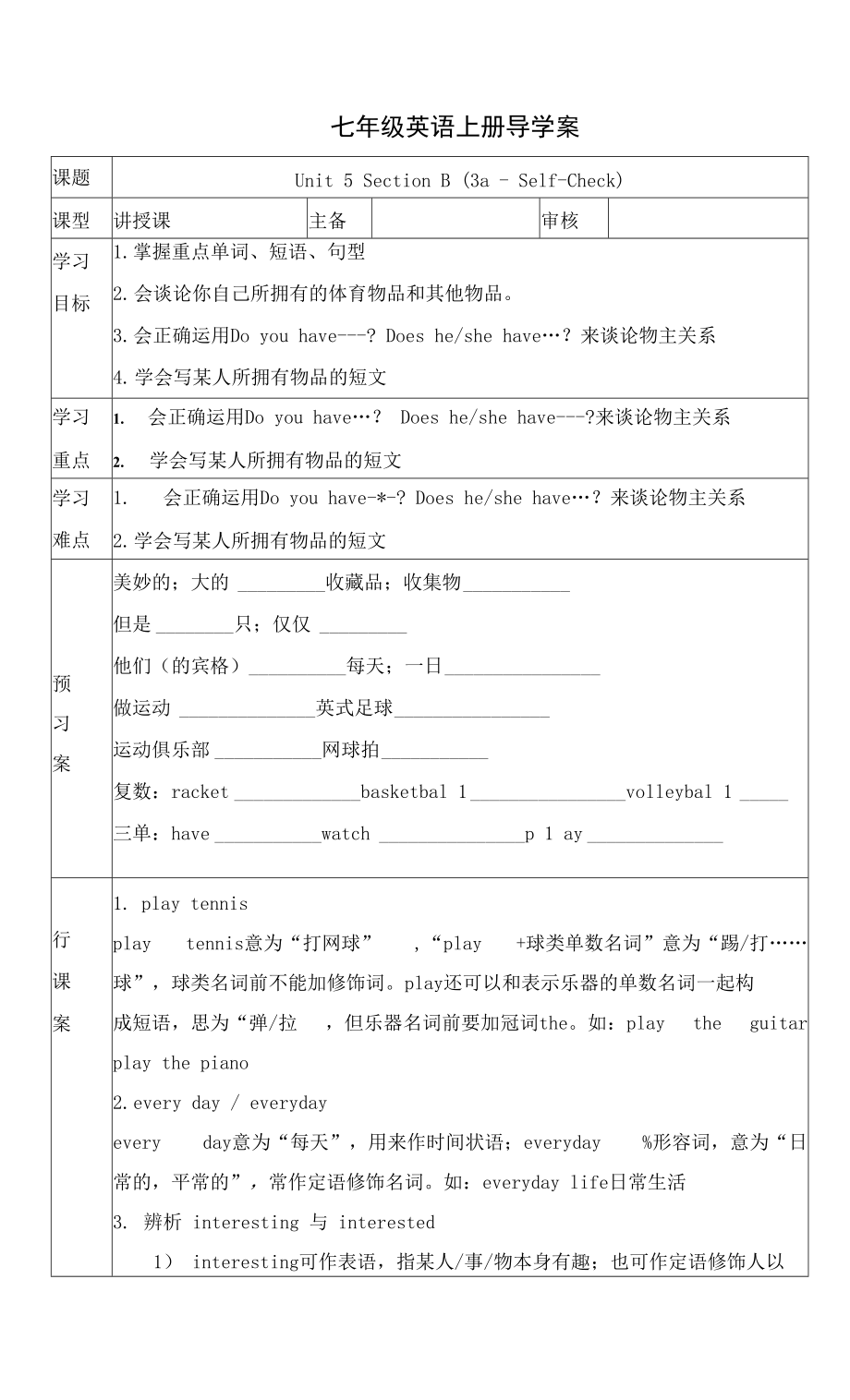《Unit5SectionB(3a–Self-Check)導(dǎo)學(xué)案 人教版七年級英語上冊》由會(huì)員分享����,可在線閱讀���,更多相關(guān)《Unit5SectionB(3a–Self-Check)導(dǎo)學(xué)案 人教版七年級英語上冊(3頁珍藏版)》請?jiān)谘b配圖網(wǎng)上搜索���。
1、七年級英語上冊導(dǎo)學(xué)案
課題
Unit 5 Section B (3a - Self-Check)
課型
講授課
主備
審核
學(xué)習(xí)
目標(biāo)
1. 掌握重點(diǎn)單詞���、短語、句型
2. 會(huì)談?wù)撃阕约核鶕碛械捏w育物品和其他物品����。
3. 會(huì)正確運(yùn)用Do you have---? Does he/she have…?來談?wù)撐镏麝P(guān)系
4. 學(xué)會(huì)寫某人所擁有物品的短文
學(xué)習(xí)
重點(diǎn)
1. 會(huì)正確運(yùn)用Do you have…���? Does he/she have---?來談?wù)撐镏麝P(guān)系
2. 學(xué)會(huì)寫某人所擁有物品的短文
學(xué)習(xí)
難點(diǎn)
1. 會(huì)正確運(yùn)用Do you have-*-?
2����、 Does he/she have…��?來談?wù)撐镏麝P(guān)系
2. 學(xué)會(huì)寫某人所擁有物品的短文
預(yù)
習(xí)
案
美妙的;大的 收藏品���;收集物
但是 只���;僅僅
他們(的賓格) 每天;一日
做運(yùn)動(dòng) 英式足球
運(yùn)動(dòng)俱樂部 網(wǎng)球拍
復(fù)數(shù):racket basketbal 1 volleybal 1
三單:have watch p 1 ay
行
課
案
1. play tennis
play tennis意為“打網(wǎng)球” ,“play +球類單數(shù)名詞”意為“踢/打……
球”��,球類名詞前不能加修飾詞��。play還可以和表示樂器的單數(shù)名詞一起構(gòu)
成短語����,思為“彈/拉 ,但樂
3���、器名詞前要加冠詞the����。如:play the guitar
play the piano
2. every day / everyday
every day意為“每天”���,用來作時(shí)間狀語���;everyday %形容詞���,意為“日
常的,平常的”����,常作定語修飾名詞。如:everyday life日常生活
3. 辨析 interesting 與 interested
1) interesting可作表語��,指某人/事/物本身有趣��;也可作定語修飾人以
�
物
①The book is interesting.這書很有趣���。(作表語)
②I have an interesting boo
4����、k,我有本有趣的書����。(作定語)
2) interested 用于 be/get/bccome interested in…(對 感興趣)這
結(jié)構(gòu)中����。
He is interested in playing football.他對踢足球感興趣。
檢
測
案
( )1. you have a pen?
A. do B. does C. Do D. Does
( )2.—Do Lucy and Lily have a baseball? —Yes, .
A. she does B. she has C. they do D. they have
( )3.一Let's play
5���、 basketball. 一No, .
A. it's boring B. it��,s interesting C. it's good D. it's fun
()4. Let's TV.
A. look B. look at C. see D. watch
( )5. Do you play ?
A.basketballs B. a basketbal l C. basketball D. the
basketball
( )6. Let's .
A.play ping-pong B. to play ping-pong
C.playing ping-pong D.
6���、play the ping-pong
( )7. — Can you play soccer me after class?
—OK.
A. about B. with C. for D. of
( )8. Let' s computer games.
A. playing B. plays C. play D. to play
( )9. — Does your brother ping-pong balls?
—Yes, he three.
A. have; have B. has; have
�
c.
have; has D. has; has
(
)10. — Do you have a basebal1?
一 . But I don' t have a baseball bat.
A.
Yes, I am B. No, I'm not
C.
Yes, I do D. No, I don, t
 Unit5SectionB(3a–Self-Check)導(dǎo)學(xué)案 人教版七年級英語上冊
Unit5SectionB(3a–Self-Check)導(dǎo)學(xué)案 人教版七年級英語上冊

